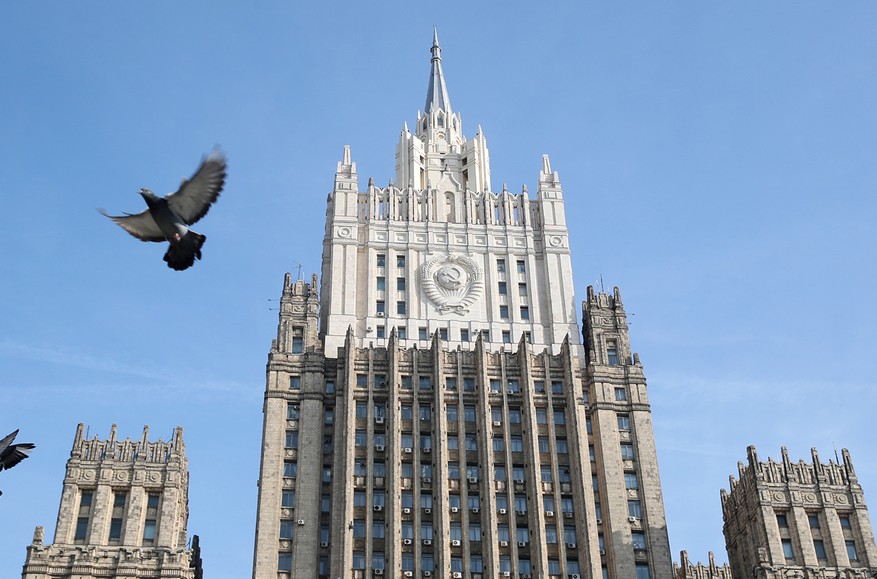Source: The Insider
“Foreign Ministry Rejects Accusations that Russia Violated the Budapest Memorandum” hailed the headline of a recent RIA Novosti article.
According to the article: “Accusations that Russia is violating the Budapest Memorandum are untenable. Its ‘legal foundation’ was undermined long before 2014, said Andrei Belousov, Russian delegation to the Non-Proliferation Treaty (NPT) Conference deputy chairman.
‘This document (the Budapest Memorandum – ed.), which like other such documents is in essence a political declaration, based on fundamental norms of international law and UN and OSCE principles’ he said.
However, the diplomat pointed out that Russia’s opponents have violated these principles several times, and thus ‘even if not directly, they questioned the document’s validity’.
Belousov said: ‘Among the events that allow us to draw this conclusion are the Yugoslavia bombings, the de facto separatism of Kosovo under the direct pressure of the US and its allies and the Western countrie intervining in Ukraine’s internal affairs in 2004, which led to a creeping coup in Ukraine under the guise of democratic processes’.
Thus, says Belousov, the legal foundation of the memorandum ‘was undermined long before 2014. Those states making baseless and false accusations against Russia, trying to discredit, demonise and isolate it, should conduct an objective analysis of their own destructive actions, including those violating international law’.
Here is the full test of the 1994 Budapest Memorandum:
- The Russian Federation, the United Kingdom of Great Britain and Northern Ireland, and The United States of America reaffirm their commitment to Ukraine, in accordance with the principles of the CSCE Final Act, to respect the independence and sovereignty and the existing borders of Ukraine.
- The Russian Federation, the United Kingdom of Great Britain and Northern Ireland, and The United States of America reaffirm their obligation to refrain from the threat or use of force against the territorial integrity or political independence of Ukraine, and that none of their weapons will ever be used against Ukraine except in self-defense or otherwise in accordance with the Charter of the United Nations.
- The Russian Federation, the United Kingdom of Great Britain and Northern Ireland, and The United States of America reaffirm their commitment to Ukraine, in accordance with the Principles of the CSCE Final Act, to refrain from economic coercion designed to subordinate to their own interest the exercise by Ukraine of the rights inherent in its sovereignty and thus to secure advantages of any kind.
- The Russian Federation, the United Kingdom of Great Britain and Northern Ireland, and The United States of America reaffirm their commitment to seek immediate United Nations Security Council action to provide assistance to Ukraine, as a non-nuclear-weapon state party to the Treaty on the Non-Proliferation of Nuclear Weapons, if Ukraine should become a victim of an act of aggression or an object of a threat of aggression in which nuclear weapons are used.
- The Russian Federation, the United Kingdom of Great Britain and Northern Ireland, and The United States of America reaffirm, in the case of Ukraine, their commitment not to use nuclear weapons against any non-nuclear-weapon state party to the Treaty on the Non-Proliferation of Nuclear Weapons, except in the case of an attack on themselves, their territories or dependent territories, their armed forces, or their allies, by such a state in association or alliance with a nuclear weapon state.
- Ukraine, The Russian Federation, the United Kingdom of Great Britain and Northern Ireland, and The United States of America will consult in the event a situation arises which raises a question concerning these commitments.
This Memorandum will become applicable upon signature.
Unfortunately, Belousov did not explain how the bombing of Yugoslavia in 1999 violated the legal basis of the Budapest Memorandum, which had nothing to do with the Balkan region. How exactly the West interfered in Ukrainian internal affairs in 2004, when a mass protest movement (known as the Orange Revolution, ed.) prevented presidential election falsification, also remains a mystery. And, by the way, the ‘creeping coup’, as Belousov put it, for some reason did not prevent the automatic extension of the Russian–Ukrainian Friendship Treaty in 2008, which Ukraine terminated only four years after the annexation of Crimea and the outbreak of the war in Donbas.
Source: The Insider





